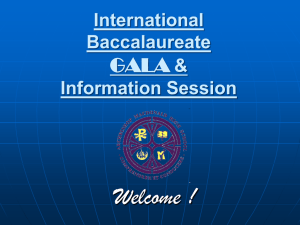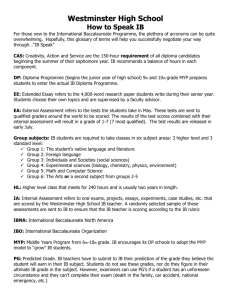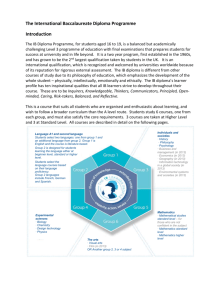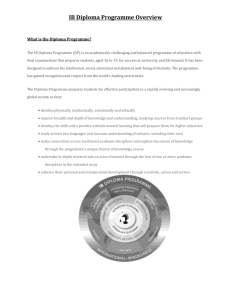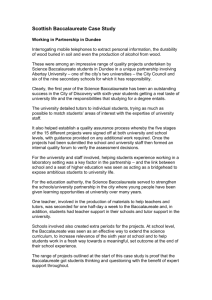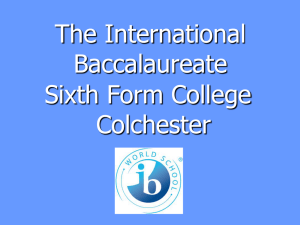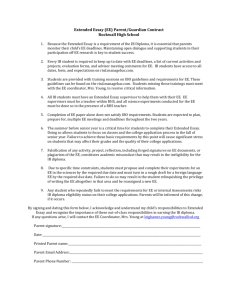IB Courses
advertisement
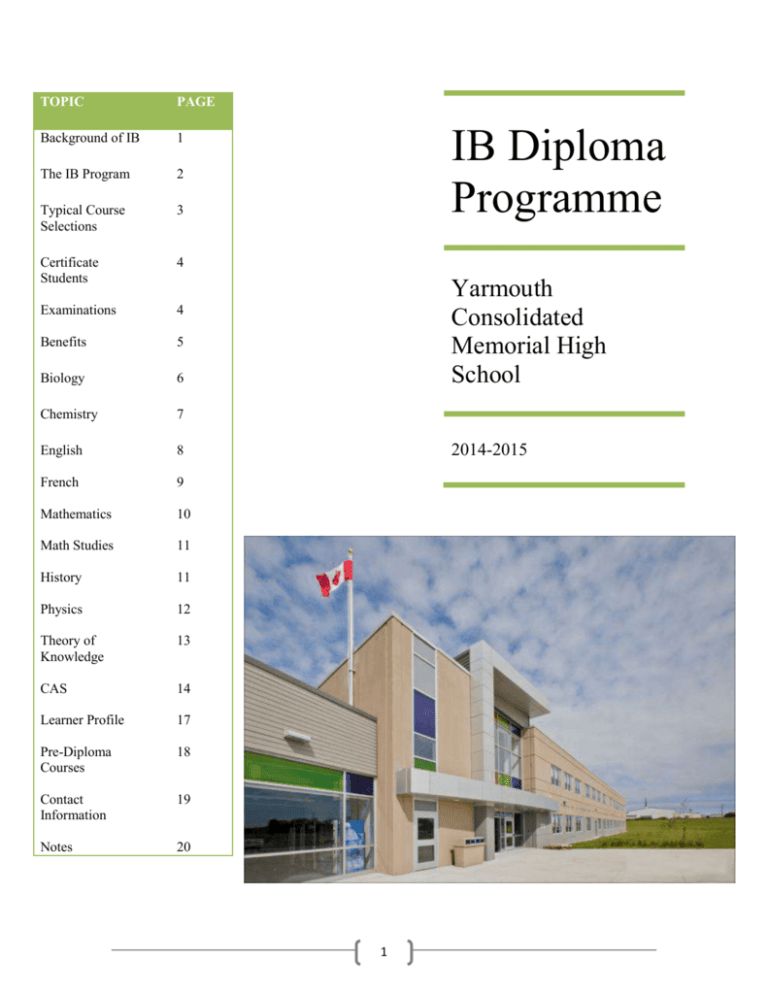
TOPIC PAGE Background of IB 1 The IB Program 2 Typical Course Selections 3 Certificate Students 4 Examinations 4 Benefits 5 Biology 6 Chemistry 7 English 8 French 9 Mathematics 10 Math Studies 11 History 11 Physics 12 Theory of Knowledge 13 CAS 14 Learner Profile 17 Pre-Diploma Courses 18 Contact Information 19 Notes 20 IB Diploma Programme Yarmouth Consolidated Memorial High School 2014-2015 1 BACKGROUND OF THE IB PROGRAM The International Baccalaureate Diploma Programme is recognized throughout the world as a very comprehensive and challenging high school curriculum. Currently there are over 2000 schools in more than 144 countries that offer the program. YCMHS became one of those schools in April, 2007. The International Baccalaureate was originally conceived and designed to meet the needs of the children of members of the international diplomatic and business communities. Since those students were often highly mobile, it was not uncommon for them to experience schools where the curriculum and expectations were deemed inadequate. Since European countries in particular required secondary students to pass a rigorous series of exams, such as the British “A Levels” or the French “Bach”, a consistently high level of preparation was necessary. Thus, ten member schools of the International Schools Association created the International Baccalaureate Organization in Geneva in 1963. At the outset, it received funding from governments and private benefactors, such as the Ford Foundation and the Mountbatten Fund. The founders then set out on their mission of creating an international curriculum that would satisfy the demands of various nation education ministries. From 1963 through 1969 working parties, consisting of both university and secondary teachers, devised the various syllabi and prepared a set of examinations that was first administered on a trial basis in 1969. Since the results met the expectations of the participating schools, negotiations with governments and a number of major universities were conducted. Consequently, the IB was recognized as a credential in lieu of national exams and as sufficient for university admission. Though the process of introducing the IB to universities around the world would be a long one, the promotion of the program was facilitated more than anything by the high quality of preparation exhibited by IB graduates after they entered post-secondary education. The greatest boost during those formative years came in 1966 when Mr. Alex Peterson, Director of the Department of Educational Studies at Oxford University, assumed responsibility for directing the project. Since the IB was so closely linked with Oxford, which supplied continuous evaluation during its entire experimental period in 1976, considerable credibility was derived from the relationship alone. Yet more than anything else, acceptance was won by the inherent quality of the program itself, and universities around the world extended their recognition not only for admission purposes, but in terms of advanced placement and credit as well. The project received unanimous recognition in UNESCO’s General Conference in 1975 and was confirmed at the first Intergovernmental Conference at The Hague in 1976 where fifteen countries agreed on a plan of action and offered moral and financial support. Rapid expansion quickly followed. One of the most pivotal events in the early growth was the acceptance of the IB in 1978 into the first public school, Francis Lewis High School in Queens, New York. Greatly encouraged by the experience, the school began to publicize broadly the benefits of the IB in various periodicals and journals. Coincident with the public demand for excellence in education, the time could not have been better. Forward thinking public schools around the world sought to join the IB family. 2 THE INTERNATIONAL BACCALAUREATE PROGRAM The IB Diploma program is a comprehensive curriculum designed for the last two years of high school, which consists essentially of six core courses, a unique seventh course called the Theory of Knowledge, an extended essay of up to 4000 words, and a service requirement. A school may choose whatever options it wishes within each of the six subject groups. For example, we have chosen French for our Language B (foreign language). Potential IB courses include the following (those that YCMHS currently offer are indicated by asterisks): Group 1: Language A: Literature HL* First language literature, including the study of selections from world literature Group 2: Language Acquisition Language A SL* students. A self-taught literature course for fluent or bilingual Language B* A foreign language course for students with previous experience in the language Language ab initio* A foreign language course for beginners Classical languages Classical Greek, Latin Group 3: Individuals & Societies History*, Geography, Economics, Philosophy, Psychology, Social and Cultural Anthropology, Business and Management, Information Technology in a Global Society, Islamic History Group 4: Experimental Sciences Biology*, Chemistry*, Physics*, Environmental Systems, Design Technology Group 5: Mathematics and Computer Sciences Mathematics HL, Mathematics SL*, Math Studies SL*, Further Mathematics, Computer Science Group 6: The Arts Visual Arts*, Music, Theatre Arts ADDITIONAL REQUIREMENTS 1. Theory of Knowledge The Theory of Knowledge course is a unique study for secondary school students. This course gives the IB a distinct and special character. 2. Extended Essay IB Diploma Diploma students must prepare a 4000-word essay, under the supervision and guidance of a teacher, in one of the disciplines that they have studied. Due by December of the final year, the essay is graded by an external examiner. 3 (continued from page 3) 3. CAS All diploma students must engage in activities that involve various aspects of Creativity, Action and Service, all of which must fulfill certain learning outcomes. HIGHER AND STANDARD LEVELS Most courses are taught at two levels, higher and standard. Of the six basic courses, diploma students must take three at each level. All higher level courses are two years in duration and offer a syllabus that often exceeds the requirements of first-year university. Standard courses, though still rigorous, do not require the same breadth and depth as the higher level. They are also two year courses, though the school can opt to teach some in one year. YCMHS courses include English, History, Biology, Chemistry, and French at the higher level, and Physics, Chemistry, French, Visual Arts, Mathematics, and Math Studies at the standard level. TYPICAL COURSE SELECTIONS A typical diploma student attending YCMHS who is interested in the sciences** might structure their program, with Theory of Knowledge, to include: Higher Level English A History Chemistry Standard Level Mathematics Physics French **It should be noted that with the intent of the IB diploma program to provide students with a well-rounded academic program, it may not be possible for a student to take three IB sciences and fulfill the requirements for both the IB diploma and a NS High School leaving certificate. A student attending YCMHS who is interested in the humanities might structure the program in this fashion: Higher Level English A History Biology Standard Level Math Studies Visual Arts French Although all efforts are made to accommodate the course selections of every student, timetable restrictions may cause the occasional conflict. The IB Diploma program is always available, but the scheduling of a student’s first choice in courses cannot be guaranteed. 4 INDIVIDUAL COURSE STUDENTS Some IB students do not opt for the full diploma, but take a limited number of courses based on their particular interests and aptitudes. For example, one with a scientific bent might take Chemistry or Biology, while a more artsoriented student might be found in English, French or History. These are students with all-around ability who are not committed to the full program, but do profit in varying degrees from limited participation. EXAMINATIONS YCMHS operates with a two-tier evaluation system within the IB program. Students receive their IB scores as well as regular school marks. IB students’ final marks are externally graded on a scale of one (1) to seven (7). The International Baccalaureate Organization’s maintenance of its high standards is in great measure attributable to its system of external examinations. The examinations office in Cardiff, Wales, at the direction of headquarters in Geneva, oversees the developments, administration, and grading of all IB examinations. Most students write in May, except for those in the Southern Hemisphere, who write in November. Thus, YCMHS students write in May at the completion of their respective courses. Those who begin the program in September of 2013 for example, usually write their final exams in May of 2015. Since the primary objective of the IB is “learning how to learn,” with special focus on the development of cognitive skills and effective capacities, assessment procedures are designed to emphasize process rather than content, and to achieve a balanced assessment of a student’s performance. The form of assessment is defined with reference to the specific performance criteria for each subject and may consist of some or all of the following: essay and short answer questions, document and data-based questions, multiple choice objective tests, and oral exams. The latter, which is a required part of all language exams, involves individual interviews. Written exams, which consist of from one to three separate papers, range from two and a half to four and a half hours in total length. IB students around the world take identical exams on the same day in various subjects. The papers are dispatched immediately to examiners around the world. For example, papers from Nova Scotia could be sent to countries as diverse as Belgium, Brazil, Lesotho, and Luxembourg. Exam results are collected in Cardiff and sent to students and universities in July. Since IB exam results are not available until many months after university admission and scholarship decisions are made, those universities that utilize IB results for either acceptance and/or scholarship purposes rely on “anticipated” grades from the IB teachers and internal school marks as a basis for their decisions. SCHOOL MARKS All YCMHS IB students also receive school grades in the same fashion as everyone else. Thus, a student who may have done well throughout the program, but performed poorly on an IB exam would not suffer an extreme hardship because the permanent school record would reflect the work during the course. IB marks are usually converted to percentage marks in IB courses so as not to disadvantage students’ ranking and scholarship opportunities. 5 PROGRESS REVIEW MEETINGS IB teachers and the coordinator meet periodically to discuss the program, share ideas, and most importantly, review student performance. Attention is paid not only to student academic progress but also to how well students are coping with the demands of the program. There are some individuals who may possess sufficient aptitude but may find the demands so stressful that remaining in the full program may not be in their best interest. In such cases the recommendation would be to reduce the load somewhat by taking the academic level course. All decisions are made strictly in accordance with what best serves the student. BENEFITS There are a number of special benefits gained by IB students, particularly those in the full diploma program. They include: 1. 2. 3. 4. 5. 6. 7. 8. 9. 10. A genuine challenge, even to the most academically inclined The development of a critical thinking approach A program and curriculum that is recognized worldwide An internationally based standard of achievement The acquisition of an international and multi-cultural perspective The development of excellent time management and study skills Classes with other highly motivated students Social service activities Enhances scholarship opportunities Course credit or advanced placement standing at many universities 6 COURSE DESCRIPTIONS International Baccalaureate Biology HL Biology is the study of living organisms, applying the techniques of the experimental sciences. This study is undertaken at a variety of levels from the molecular to that of the biosphere, each with its own distinctive approaches and methods. However, by the end of the course the student should have developed an appreciation of the interactions among these levels, and of organisms as functioning entities within the biosphere. The design of the International Baccalaureate Biology program seeks to incorporate recent scientific thinking in many countries. Curriculum content has been selected with the realization that because biology is continuously and rapidly progressing both in breadth and depth, the contemporary biology curriculum can never be considered to be stable. Scientific method is best developed and understood through personal experience, therefore the emphasis throughout the program is on providing students with ample opportunities for research and discovery. Topics: 1. 2. 3. 4. 5. 6. Statistical Analysis Cells The Chemistry of Life Genetics Ecology and Evolution Human Health & Physiology AHL 7. 8. 9. 10. 11. Nucleic Acids and Proteins Cell Respiration and Photosynthesis Plant Science Genetics Human Health & Physiology Two Options: Option D: Evolution Option G Ecology and Conservation The final mark for this course will consist of: SL HL Exam Paper 1 20% 20% Exam Paper 2 32% 36% Exam Paper 3 24% 20% IA Labs and 24% 24% Group 4 Project 7 International Baccalaureate Chemistry This course is offered in both higher level and standard level. IB Chemistry is designed to further the student’s understanding of chemistry and how it applies to the world while also helping the students advance their problem-solving strategies. The students will work collaboratively on lab activities that involve the use of computer and probe technology where appropriate. They will develop their own purposes and procedures to investigate topics. They will need to make choices in terms of data collection, processing, analysis, evaluations and presentations. The presentation format will include technology (data spreadsheets, Powerpoint, webpages, video and audio programs, as well as specific chemistry programs). They will develop laboratory manipulative skills and mathematical skills, including the use of significant digits and experimental error, necessary to analyze and interpret experimental data. Topics: 1. 2. 3. 4. 5. 6. 7. 8. 9. 10. 11. 12. Basic Principles, Terminology, Formulae, Equations, Stoichiometry Atomic Theory Structure and Bonding Energetics State of Matter Physical Equilibrium Chemical Equilibrium, including REDOX, Acids, and Bases Kinetics Periodicity Organic Chemistry, Naming, Mechanistic Principles, Reactions Group IV Project (all sciences) Option Topics (chosen by instructor) The final mark for this course will consist of: SL HL Exam Paper 1 20% 20% Exam Paper 2 32% 36% Exam Paper 3 24% 20% IA Labs and 24% 24% Group 4 Project 8 International Baccalaureate English This course is offered in higher level only. The English program is a literature course studied at the first language level of the student. It encourages an appreciation of literature and the knowledge of the student’s own culture and that of other societies. Students and teachers engage in complex discussions and analysis of major texts from world literature. The purpose of the programme is to broaden the student’s global perspective in becoming an active, compassionate, lifelong learner. The aims of the English program are to enable the student to express ideas with clarity, coherence, precision, and fluency in both written and oral communication; to engage in a rigorous approach to literary analysis; to encourage a personal appreciation of literature and to develop an understanding of the techniques involved in literary study and criticism; to introduce literary classics and a range of modern writing in different literary genres, styles and contexts; and to promote an international perspective through the comparative study of works from the student’s own and other cultures. Students’ writing and speaking skills are assessed using a variety of methods which give a broad picture of the students’ linguistic proficiency and ability to think critically. Thirteen literary works are selected for examination at the higher level. These works are selected according to a four-part format set by IB, including World Literature, texts for Detailed Study, Groups of Works, and School’s Free Choices. Past selections for YCMHS have included the following: A Thematic Unit of Works in Translation A Doll’s House, So Long a Letter, One Day in the Life of Ivan Denisovich Detailed Study I Know Why the Caged Bird Sings, Macbeth, poetry of Seamus Heaney, Groups of Works The Glass Menagerie, Death of a Salesman, Rosencrantz and Guildenstern Are Dead, and Blood Relations School’s Free Choice Mercy Among the Children, Things Fall Apart, and Lord of the Flies The final mark for this course will consist of: HL Exam Paper 1 20% Exam Paper 2 25% Works in Trans essay 25% IA Oral 15% Presentation IA Oral 15% Commentary 9 International Baccalaureate French (Language B) This course is offered in both higher level and standard level. The French Language B programme is communicative in that it focuses principally on interaction between speakers and writers of the target language. The main aim of the programme is to prepare the leaner to use the language appropriately in a range of situations and contexts and for a variety of purposes. The skills of listening, speaking, reading, and writing will be taught and developed through the study of a wide range of oral and written texts if different styles and registers. Equal emphasis will be given to the teaching of these four skills. Authentic materials will be used wherever possible and students will be given the maximum exposure to the French language. The four language skills listed above will be integrated as far as possible with the preparation and presentation of all learning activities and assessment tasks. In particular, the continuous assessment of oral work will be integrated into regular classroom activities. The teaching of an appropriate range of grammatical structures will also be integrated as far as possible with the study of themes and texts and the acquisition of skills. The aims of the French B Language programme are to: 1. 2. 3. 4. 5. Develop the ability to communicate accurately and effectively in speech and in writing within a range of contexts; Develop the ability to understand the language demands of transactional and social contacts; Provide students with a sound linguistic base for further study, work and leisure; Offer insights into the culture of the countries where the language is spoken; Provide the opportunity for enjoyment, creativity and intellectual stimulation. The final mark for this course will consist of: SL HL Exam Paper 1 25% 25% Exam Paper 2 25% 25% Written Assign 20% 20% IA Oral 20% 20% IA Oral Activity 10% 10% International Baccalaureate French ab initio Language ab initio is a language acquisition course designed to provide students with the necessary skills and intercultural understanding to enable them to communicate successfully in an environment where the language studied is spoken. This process encourages the learner to go beyond the confines of the classroom, expanding an awareness of the world and fostering respect for cultural diversity. This course uses a balance between approaches to learning that are teacher-centered (teacher-led activities and assessment in the classroom) and those that are learner-centered (activities designed to allow the students to take the initiative, which can also involve student participation in the evaluation of their learning). The teacher is best placed 10 to evaluate the needs of the students and is expected to encourage both independent and collaborative learning. This course develops students’ linguistic abilities through the development of receptive, productive and interactive skills. French ab initio is organized into three themes. • Individual and society • Leisure and work • Urban and rural environment Each theme has a list of topics that provides the students with opportunities to practice and explore the language as well as to develop intercultural understanding. Through the development of receptive, productive and interactive skills, students should be able to respond and interact appropriately in a defined range of everyday situations. There are five assessment objectives for French ab initio. Students will be assessed on their ability to: 1. demonstrate an awareness and understanding of the intercultural elements related to the prescribed topics 2. communicate clearly and effectively in a range of situations 3. understand and use accurately the basic structures of the language 4. understand and use an appropriate range of vocabulary 5. use a register and a format that are appropriate to the situation. The final mark for this course will consist of: SL Exam Paper 1 30% Exam Paper 2 25% Written Assign 20% IA Ind. Oral 25% International Baccalaureate Mathematics SL Mathematics SL is a course designed to give students who already have a strong work ethic and concrete background in mathematics the necessary tools to prepare for further study of mathematics and related fields, such as science. Basic knowledge of mathematical skills and concepts are assumed during the course of study. The course will focus on introducing important mathematical concepts through the development of mathematical techniques. Students will apply their new mathematical knowledge to solve realistic problems. This course is a blend of direct instruction, portfolio work (which involves independent student mathematical investigation and modeling), and independent research of mathematical topics. A variety of assessment techniques will be administered as checkpoints for student learning. Topics: 1. 2. 3. 4. 5. Irrational numbers Statistics and Probability Theory Vectors Analytic Geometry Calculus (differential and integral, minimum 35 hours of class time) The final mark for this course will consist of: SL 11 Exam Paper 1 Exam Paper 2 Exploration 40% 40% 20% International Baccalaureate Math Studies SL This course is intended for students who are likely not planning to continue studying mathematics after high school. These students may come from various backgrounds and strengths. They will be hard working and self-motivated. The purpose of the course is to give students experience in several topics of mathematics with very practical applications. They will be able to explore how mathematics is relevant in other subjects that they may be studying concurrently. By working through contextual problems, they will learn to think logically, extract relevant information, make conclusions and communicate solutions clearly. Students will be expected to solve problems that lend themselves to a variety of approaches, and multi-stepped solutions. Students will also develop problem solving approaches of their own. Students will become proficient at using technology when appropriate. They will learn that mathematics is one language that is universal throughout the globe, and that information can be conveyed clearly using tables, charts, graphs, and universal symbols and language. Students will explore international currencies and learn about mathematicians from different countries and their discoveries. From the development of geometric ideas by Pythagoras in ancient Greece, to the writings of Al’Khwarizmi on algebra, students will be exposed to mathematical discoveries in an historical and geographical context. The final mark for this course will consist of: SL Exam Paper 1 40% Exam Paper 2 40% Project 20% International Baccalaureate History This course is offered in higher level only. International Baccalaureate History studies the late 19th century to modern day through the studying of: (a) Communism in crisis; (b) Origins and development of authoritarian and single party states; and (c) The Cold war; (d) Imperial Russia, revolutions, emergence of Soviet State; (e) The Soviet Union and Eastern Europe, 1924 – 2000; (f) The Second World War and post-war Western Europe, 1939 - 2000. In addition to regular testing procedures, there are written papers required throughout the course and an internal assessment due in the winter of the student’s second year. There will an in-school examination process and the IB offers a final external exam for which all students are expected to prepare. The higher level option in history requires students to develop a more comprehensive understanding of a wider variety of regional historical topics. The final mark for this course will consist of: HL Exam Paper 1 20% Exam Paper 2 25% Exam Paper 3 35% IA Historical 20% 12 Investigation Essay International Baccalaureate Physics This course is offered in standard level only. Physics is the most fundamental of the experimental sciences, as it seeks to explain the universe itself, from the very smallest particles to the vast distances between galaxies. Students will study physics keeping in mind the scientific method, critical thinking, and the international language of mathematics. Physics SL Core Topic 1: Physics and physical measurement Topic 2: Mechanics Topic 2 is enhanced with projectile motion, navigation with vectors and more advanced vector application problems. Several topics are extended and deeper problem solving is employed. This enhancement would be similar to Topic 9 AHL. Topic 3: Thermal Physics Topic 4: Oscillations and Waves Topic 4 is enhanced with topics from Option A and AHL Topic 11. Topic 5: Electric Currents Topic 5 is enhanced with more advanced circuit analysis. Also motors and generators are studied such as in AHL Topic 12, electromagnetic induction. Topic 6: Fields and Forces Topic 7: Atomic and Nuclear Physics Topic 8: Energy, Power and Climate Change Options Option B: Quantum Physics and Nuclear Physics Option E: Astrophysics Students may opt to study any option of their choosing independently. The final mark for this course consists of: SL Exam Paper 1 20% Exam Paper 2 32% Exam Paper 3 24% IA Labs and 24% Group 4 Project 13 International Baccalaureate Visual Arts This course is offered in standard level only. Diploma candidates in the International Baccalaureate Programme must complete one subject from each of the six subject groups. Visual Arts is one course from the sixth group of arts and electives. Students have the option of selecting either Visual Arts Standard Level A (SLA), or Visual Arts Standard Level B (SLB). Visual Arts (SLA) is designed for the arts student with great imagination and interest for creating art. (SLA) students are required to spend 105 hours in studio work, and 45 hours on research related activities in their workbooks. Visual Arts B (SLB) is designed for the student whose interests lie more with critical analysis of art. (SLB) students are required to fulfill 45 hours of studio time, and 105 hours on research workbook related material. The course will investigate why different cultures produce art and encourage students to integrate a variety of traditions and techniques into their own artworks. A variety of drawing, painting and print media will be used to explore culture groups from Africa, Asia, Australia, North, Central and South America, and Europe. The research workbook is necessary for student reflection on the role of art in the world. Topic 1: Cultural Link to Art Making Topic 2: Artistic Techniques and Processes Topic 3: Focused Self-Directed Artistic Investigation Topic 4: Learning From Other Artists Topic 5: Art Vocabulary Topic 6: Sources and References Topic 7: Critical Observation and Reflection Topic 8: Relationship Between Investigation and Art Pieces Made The final mark for this course consists of: SL Studio Work 60% 8 to 12 Art Pieces Investigations 40% 18 – 20 Investigation Workbook Pages Candidate Statement Art Titles Form 15 Minute Video Interview Theory of Knowledge This course is obligatory for every candidate for the Diploma because it is a key element in the educational philosophy of the IB. Its purpose is to stimulate critical reflection upon the knowledge and the experience of students both in and outside the classroom. The course is thus “philosophical” in the sense that it is meant to encourage students to acquire a critical awareness of what they and others know through analyzing concepts and arguments as well as the bases of value judgements, which all human beings have to make. 14 The aims of the Theory of Knowledge programme are to lead students to: • Engage in reflection on, and questioning of, the bases of knowledge and experience; • Be aware of subjective and ideological biases; • Develop a personal mode of thought based on critical examination of evidence and argument, and; • Formulate rational arguments Performance Criteria Students should be able to: • Use language clearly, consistently, and appropriately; • Appreciate the strengths and limitations of the various kinds of knowledge, as well as their similarities and differences; • Relate subjects studied to one another, to general knowledge, and to living experience; • Demonstrate awareness of the virtues and the limitations of both their individual outlook and the views common to the communities and cultures to which they belong, and; • Show proper appreciation of the power of reason to recognize its capacities and its own limitations, to overcome ignorance and prejudice as well as to advance both academic knowledge and practical understanding between individuals, communities, nations, and cultures. Program Outline 1. 2. 3. 4. Knowledge Ways of Knowing a) Reason b) Emotion c) Perception d) Language Areas of Knowledge a) Mathematics b) Natural Sciences c) Human Sciences d) History e) Ethics f) The Arts An exploration of what it means to live a “good life” Essays and Assessment Diploma students are required to submit one essay, for external assessment, from the list of specific topics provided by IB. Diploma students will also be internally assessed on an in-class presentation they make during the course. CAS (Creativity, Action, Service) The IB Diploma Programme seeks to provide a comprehensive and well-balanced educational experience. Thus, every diploma student is required to engage in constructive “non-academic” service-related activities. These activities must meet the following four criteria: 1. Real, purposeful activities with significant outcomes 15 2. 3. 4. Personal challenge – tasks must extend the student and be achievable in scope Thoughtful consideration, such as planning, reviewing progress, reporting Reflection on outcomes and personal learning Following the four criteria, eight learning outcomes must be met as well: 1. 2. 3. 4. 5. 6. 7. 8. Increased awareness of your own strengths and areas for growth You are able to see yourself as an individual with various skills and abilities, some more developed than others, and understand that you can make choices about how you wish to move forward. Undertake new challenges A new challenge may be an unfamiliar activity, or an extension to an existing one. Planned and initiated activities Planning and initiating will often be in collaboration with others. It can be shown in activities that are part of larger projects as well as in small student-led activities. Worked collaboratively with others Collaboration can be shown in different activities, such as team sports, playing music in a band, or helping in a kindergarten. At least one project, involving collaboration and integration of at least two creativity, action, and service activities, is required. Shown perseverance and commitment in their activities At a minimum, this implies attending regularly and accepting a share of responsibility for dealing with problems that arise in the course of activities. Engaged with issues of global importance You may be involved in international projects but there are many global issues that can be acted upon locally or nationally. Considered the ethical implications of your actions Ethical decisions arise in almost any CAS activity. Evidence of thinking about ethical issues can be shown in various ways, including journal entries and conversations with CAS advisers. Developed new skills As with new challenges, new skills may be shown in activities that you have not previously undertaken, or in increased expertise in an established area. Each activity does not need to cover every outcome, but each outcome must be met and have evidence to prove it by the end of the two years. Some outcomes may be demonstrated many times in a variety of activities. Students are encouraged to develop their own program to meet their own needs and interests, as well as to complement their past experiences. It is emphasized, however, that students must have a program which provides them with opportunities for growth in creativity, action, and service. In the grade 12 year, the diploma student will have to write a reflective essay, describing each activity that they did and how they met the outcomes. Also, the student will meet with their CAS advisor to go into further detail about their activities and provide their evidence of completion. 16 17 GRADE 10 IB PRE-DIPLOMA COURSES English 10 Pre-Diploma This course is designed to prepare students for the rigorous demands of the two-year IB English course. Students must be interested in literature and willing to make the time commitment necessary for reading and for synthesizing ideas presented by this literature. Students will be responsible for daily reading assignments in order to prepare adequately for class, and some summer reading. Students will become knowledgeable of the political, scientific, literary, artistic, philosophical, and social interrelationships of the time period and geographical area from which each text originates. Students are expected to develop a refined ability for oral and written expression in order to succeed in IB English. French 10 Pre-Diploma This concentrated course will focus on intensive French language acquisition in terms of speaking, understanding and writing. Students will be expected to immerse themselves as much as possible in the French language through French media, for instance, television, radio and Internet. The goal of this course will be to bring students as close as possible to the French Immersion 10 level. This course is not open to French Immersion Students. There are two levels of pre-diploma French. One French course is designed for students enrolled in French Immersion; the other is designed for students in French Core. History 10 Pre-Diploma Throughout the course, there will be a focus on the understanding and interconnections between historical events. The course will look at the beginnings of humanity to the Renaissance. Significant time will be spent on student writing, reading, analysis, and evaluation in a historical context. In addition to the acquisition of European history content that forms the foundation for IB History, students will learn and practice the skills of historical investigation, document analysis, and thesis development and presentation. Math 10 Pre-Diploma This is a full year grade 10 honours course in Mathematics. Students who consistently work hard and seek extra help when necessary are usually rewarded with success. Approximately 60 minutes of homework should be completed five times per week. Attendance is essential since investigative learning and some practice will be done in small groups. The course consists of all topics in the current Math 10 curriculum with the following additions: radical operations and equations, exponential laws and equations, various notations, analysis of functions, linear programming, completing the square, factoring quadratics, quadratic inequalities, and transformations of quadratics. It is recommended that students have a strong background in numeracy skills. Science 10 Pre-Diploma This Science 10 is a demanding pre-university course that is designed for motivated secondary school students. Its purpose is to bridge the gap of knowledge expected for students entering the standard/ higher level International Baccalaureate Chemistry and Physics courses. The learning outcomes closely compare to the Essential Graduation Learning Outcomes for the Nova Scotia Science 10 curriculum, but are more intensely studied on a wider scope, with emphasis on topics in Chemistry and Physics. A minimum of 20 hours will be spent on laboratory work. The mark for the course is based on tests, lab work, homework, and assignments. 18 CONTACT INFORMATION If you require additional information or have any questions regarding the IB programme at YCMHS, please contact: Michael Drew IB Coordinator Yarmouth Consolidated Memorial High School 146 Forest St Yarmouth, Nova Scotia B5A 0B3 Email: michael.drew@tcrsb.ca Phone: Fax: School Website: IB Website: (902) 749-2810, ext. 9 (902) 749-2811 http://www.ycmhs.com http://www.ibo.org 19 NOTES: 20

